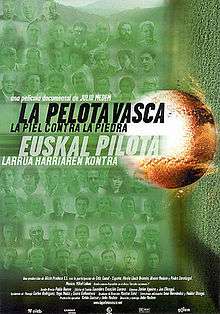The Basque Ball: Skin Against Stone
| The Basque Ball: Skin Against Stone | |
|---|---|
 Theatrical Poster | |
| Directed by | Julio Médem |
| Produced by |
Julio Médem Koldo Zuazua |
| Written by | Julio Médem |
| Cinematography |
Javier Aguirre Ricardo de Gracia Daniel Sosa Segura |
| Edited by | Julio Medem |
| Distributed by | Golem Distribución |
Release dates |
|
Running time | 110 minutes |
| Country | Spain |
| Language |
Basque English French Spanish |
The Basque Ball: Skin Against Stone (Spanish: La pelota vasca: la piel contra la piedra; Basque: Euskal pilota: larrua harriaren kontra) is a 2003 documentary film written and directed by Spanish filmmaker Julio Médem.
Overview
The film's purported intention is to create a bridge between the different political positions that coexist, sometimes violently, in the Basque Country. In order to do so, Medem edits the interviews giving a sense of dialogue between parties that refused to sit down and talk. Due to its lack of contextualization, the film may be hard to understand to audiences without previous knowledge of the Basque problem—it is obviously a film designed to be viewed by Spanish audiences, or people familiar with the issues.
The movie also utilizes footage from the Basque portions of the 1955 travelogue Around The World With Orson Welles, and continually intercuts between interviews and jai alai players.
Criticism
One of the main controversies of the documentary is that the two principal protagonists in the controversy, the then incumbent Partido Popular and ETA refused to take part in the interviews. The former went so far as to request the organisers of the Donostia-San Sebastian International Film Festival to reconsider the film's suitability. This, in turn, has led some to call it an incomplete documentary.[1]
It has also been openly criticized by both extremes, and Medem, who is Basque, has been accused of being both pro-ETA and pro-"Spanish occupation". Indeed, two of the interviewees, Iñaki Ezquerra and Gotzone Mora (both members of the intellectual group the Ermua Forum) demanded that Medem retract their interviews, accusing him of presenting the Spanish Guardia Civil and police forces as torturers and ETA and their followers as victims.[2] Despite these protests, their interviews remained due to the film's imminent release date. They did not, however, appear on the 7-hour DVD Edition.
There is a three-disc special edition DVD (ISBN 0-499-01513-4) released with seven hours of edited footage that goes deeper into the history of the Basque Country and a Spanish-language book (ISBN 84-03-09425-6).
Awards and nominations
- 2004: Nominated, Goya Awards, Best Documentary
- 2004: Nominated, European Film Awards, Best Documentary
- 2004: Nominated, Cartagena Film Festival, Best Film
Notes
- ↑ El PP pide que el Consejo del Festival de San Sebastián decida si se proyecta el filme de Medem, ("The Partido Popular asks that the council of the Festival of San Sebastián decide whether to project Medem's film"), El Mundo (Spain), 17 September 2003. Accessed 9 March 2006.
- ↑ Dos miembros del Foro de Ermua acusan a Medem de presentar al entorno de ETA como víctimas ("Two members of the Ermua Forum accus Medem of presenting those connected to ETA as victims"), El Mundo (Spain), 16 September 2003. Accessed 9 March 2006.
External links
- The official website at the Wayback Machine (archived March 7, 2005).
- The Basque Ball at the Internet Movie Database
- The Basque Ball at AllMovie